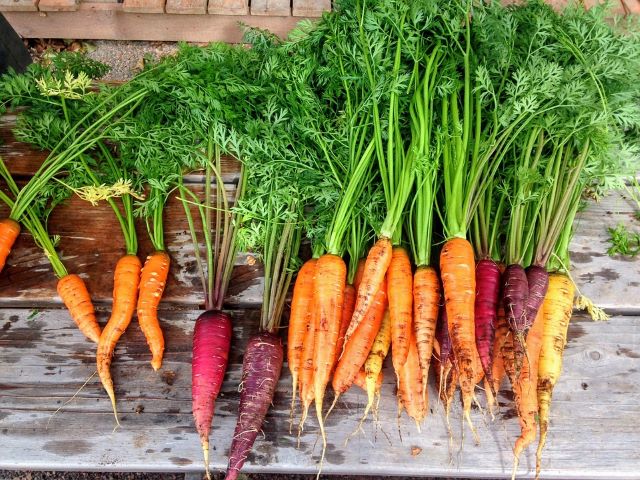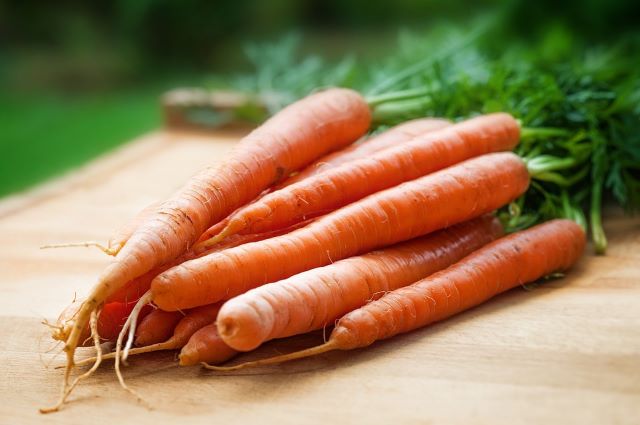Carrots are one of these ambiguous veggies and they might have you wondering, are carrots a fruit or a vegetable? Let’s take a look.

The definitive answer is carrots are a vegetable. As the root of the plant, carrots are botanically a root vegetable.
So let’s find out what classifies carrots as a vegetable, how we define fruit and vegetable as well as some of the health benefits of colored carrots.
Related: Is Sugarcane a Fruit or Vegetable? | Can You Eat Carrots That Have Sprouted?
Table of Contents
Is a Carrot a Fruit or a Vegetable?
Although we’ve already said carrots are a vegetable, it’s the carrot’s bright orange color that makes us think it should be a fruit. But let us look at the carrot from both a culinary and a botanical aspect to decide whether it is a fruit or a vegetable.
In culinary terms, a carrot would be a vegetable. Although they are rather delicious eaten raw, they are used more often in savory dishes and salads.
They can be used in desserts such as carrot cake but, despite this one deviance, the consensus would be that, in the kitchen, the carrot is a vegetable.
In scientific terms, the carrot is the root of the plant. As all roots, stems and leaves are vegetables, the carrot is classified as a vegetable.
More specifically, carrots are root vegetables, meaning they are the root of the plant. Along with carrots, some other root vegetables include beetroot, potatoes, turnips, parsnips and radishes.
So for the question of whether carrots are fruits or vegetables the answer is easy. Both botanists and chefs agree that the carrot is, without doubt, a vegetable.
How do we Classify Fruits and Vegetables?

We’ve all been told tomatoes are actually a fruit and not a vegetable. And there are many such ‘vegetables’ that sit in the gray area between fruit and vegetable.
Science tells us some are fruits even though we prepare and eat them as vegetables.
So how do we classify fruits and vegetables?
Classifying fruits and vegetables can be a little tricky. And that’s because these plants are classified by two different bodies, namely chefs and botanists.
So we have the culinary definitions and scientific definitions.
Culinary Definition of Fruit and Vegetables
In culinary terms, a vegetable is something used in savory, and usually main, dishes. This definition would therefore include eggplants, tomatoes, carrots, onions, broccoli and spinach.
And in culinary terms, a fruit is something sweet or sour and can be eaten raw, on its own. Fruits are often used in desserts.
Botanical Definition of Fruit and Vegetables
In botanical or scientific terms a vegetable is all the parts of the flower that are not the ovary. So the roots, stems and leaves of a plant are vegetables while the ovary is a fruit.
From the list above, carrots, onions, broccoli and spinach would be vegetables while eggplants and tomatoes would be fruits.
Scientifically a fruit is the mature, ripe ovary of a plant and all its components. The ovary is the reproductive structure of the plant where the seeds develop and grow.
For an object to be classified as a fruit it, therefore, must contain seeds (ovules) or a pip such as those found in apples, peaches, pumpkins and tomatoes.
There are three main classifications of fruit: simple, aggregate and multiple fruits.
Simple fruits develop from the ripening of a single ovary. Examples of simple fruits are stone fruit such as peach, cherry and apricot, legumes such as beans and peas, nuts such as hazelnuts, pomes such as apples and pears.
Aggregate fruits form from a flower with many simple pistils. The raspberry is a good example of an aggregate fruit as well as blackberries and strawberries.
Multiple Fruits form when a group of flowers join together to make a single fruit. Examples are pineapples, mulberries and breadfruit.
Colored Carrots and Their Health Benefits

Most carrots today are a bright orange color but not all carrots are orange. Before the 17th Century, carrots were black, white, red or purple.
The orange carrot was cultivated in the Netherlands in honor of the House of Orange.
Today carrots come in a variety of colors including orange, black, purple, pink, red, yellow and white.
Although all carrots are rich in potassium, vitamin C and Vitamin K and high in fiber, each color variant gives us a slightly different health benefit.
Orange Carrots Health Benefits
Orange carrots contain the most alpha and beta-carotene of all the carrot colors although many of the other colors do contain some carotene. Alpha and beta-carotene promote and support the body’s production and absorption of vitamin A.
Taking a Vitamin A supplement can be harmful as it can build up in the body and cause vitamin A toxicity. The body converts beta-carotene, found in carrots, to vitamin A as it is needed. Making it a safe and healthy way to get your necessary vitamin A.
Vitamin A is fat-soluble and so the body absorbs beta-carotene more effectively from carrots if they are combined with a little fat. Cooking your carrots in a little olive oil or butter will increase the efficacy of the body’s absorption of the vitamin A.
Carrots and Eye Health
Vitamin A is vital for good eye health. As children, we were told that if we eat our carrots we would be able to see in the dark. A bit of an exaggeration but anything to get kids to eat their veggies!
There is some truth in this, however, as it has been found that vitamin A helps the eye to convert light into a signal sent to the brain thus helping with night vision.
Vitamin A is also a powerful antioxidant that helps to reduce the oxidative stress on our eyes caused by the blue light of screens and UV radiation.
So whether you are indoors in front of a screen or outdoors in the sunshine, your eyes will benefit from a plateful of bright orange carrots.
Carrots and Skin Health
The strong antioxidant power of vitamin A has also been shown to be beneficial in the protection against UV radiation of the skin, reducing fine wrinkles and sun damage.
Studies have also shown that vitamin A can help with acne and skin blemishes.
It promotes rapid turnover of skin cells, leaving your skin looking younger and healthier.
Beta-carotene also increases skin pigmentation so can be a benefit if you are looking for that natural tan.
Carrots and Lung Health
Vitamin A helps in the maintenance of epithelial cells which are the cells in the tissue of the lining of the lungs and is thus vital for a healthy respiratory tract. Vitamin A deficiency in pregnancy can have adverse and long-term effects on the baby’s lungs.
Carrots and Mental Health
The antioxidant effects of beta-carotene have been shown to help with cognitive function and memory as well as having beneficial effects on stress-related disorders such as anxiety and depression.
Red Carrots Health Benefits
Red carrots contain lycopene. Lycopene is the phytonutrient that gives red fruits and vegetables their color. It is also found in high quantities in tomatoes.
Studies have shown that lycopene can reduce the risk of heart disease and some kinds of cancer, particularly prostate and cervical cancer.
Red carrots also contain plenty of beta-carotene which is good for eye health, skin health, lung health and mental health. Red carrots also contain molybdenum which is an essential mineral that activates key enzymes in your body that help it rid itself of certain toxins.
Yellow Carrots Health Benefits
Yellow carrots contain lutein which is linked to the reduced risk of age-related eye diseases such as macular degeneration and cataracts.
Purple Carrots Health Benefits
Purple carrots are rich in anthocyanin. Anthocyanin has anti-inflammatory properties, helps protect against heart diseases and supports a healthy immune system.
Studies have shown that after eating a diet rich in anthocyanin, test subjects verbal learning and memory improved.
Anthocyanin gives fruits and vegetables their purple color and can be found in blackberries, purple grapes, purple cabbage and purple potatoes.
Purple carrots also contain alpha and beta-carotene which helps with eye, skin, lung and mental health. And purple carrots contain nine times more polyphenol antioxidants than carrots of other colors.
White Carrots Health Benefits
White carrots, although they don’t contain the same amount of antioxidants as their bright cousins, contain plenty of potassium and are high in fiber.
Final Thoughts
So, it can be conclusively decided that carrots are a healthy root vegetable but it is important to remember that no classification is absolute. As the saying goes, “Education is knowing a tomato is a fruit. Wisdom is knowing not to put it in your fruit salad.”
Further reading:
- A Twisted Tale: 8 Causes of Deformed Carrots with Solutions
- How Many Ears Of Corn Grow On One Stalk? (Answered!)
- Why are Burpless Cucumbers Called Burpless?
- Galangal Vs. Ginger: What’s the Difference?
- Medicinal Benefits of Turmeric for Health and Wellbeing
- Turnips Vs Radishes: What’s The Difference?
- Why Are My Beets So Small? Answered!
- Globe Artichoke Vs. Jerusalem Artichoke: What’s the Difference?
- Are Olives a Fruit or Vegetable? Answered!
- Can You Eat Olives Off the Tree? Answered!
- Stop Struggling with Deformed Parsnips: 8 Causes & Solutions
